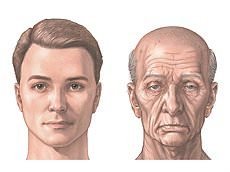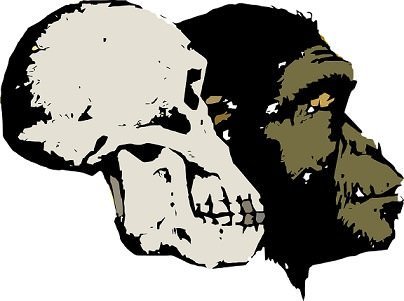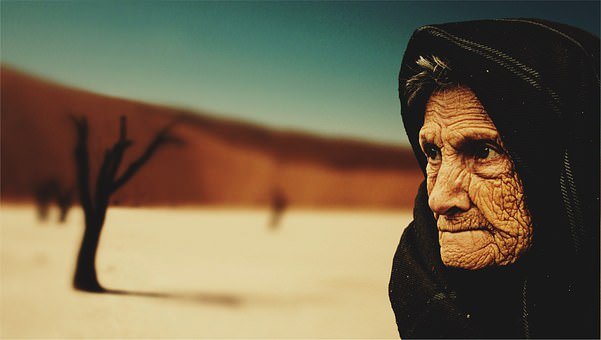History And Evolution Of Aging - [Is Aging A Process Of Evolution Or Reverse Evolution?]
Introduction
Humans have been known to live, age, and die right? Well, except you're a god or you've achieved some form of secrete immortality; but if not, then your fate is certain that you would age, and one day you would kick the bucket too. But have you stopped for a second to ask; is aging a process of evolution or reverse evolution, and why have there been swings in the age limit of our ancestors down our evolutionary tree? In this survey, we will be looking at these concepts.

[Image Source: Wikimedia commons. Public Domain licensed]
In this post, we saw the concept of Darwinism, and the theory of natural selection. But if you look closely at this; you would agree with me that one of the purposes of evolution (be it by natural selection or induced evolution) is to ensure the adaptation, survival, and sustainability of a specie (human; in this context) ref. So one could ask; if evolution is meant to ensure our survival, why shouldn't the same evolutionary process prevent us from senescence (aging)? Or could it be that the process of aging is also encapsulated in the evolution by natural selection? - Possibly to create space for the future generations to have a fair existence, and to ward off stress from Mother Nature. But if this is the case; then are we the ones surviving by "natural selection" or is it the Mother Nature surviving by "human selection"?
If you have been abreast with history (particularly; evolution) you would have discovered that there were fluctuations in the average life expectancy of our ancestors as they evolved from species to species. Take a look at this; during the era of the earliest hominid species like the Australopithecus and the Homo habilis; which was also regarded as the Paleolithic era, the life expectancy of the species was somewhat in the estimation of 33years, based on paleoanthropological reviews of their fossils [ref]. Please do well to be keeping tabs of these ages - because they would come in handy later. Progressing from the Paleolithic era into the Neolithic era, there was a little dwindle in the average life expectancy (which stood at 20years), but it rose back on progression into the early medieval era, and dwindled again into the later part of the medieval era (the averages were 35years and 30years for the early medieval and late medieval era respectively) [ref].

[Image Source: Pixabay. CC0 licensed]
look at those figures I gave earlier holistically; when species evolved from the Paleolithic era (with an average of 33years life expectancy) to the Neolithic era (with an average of 20years life expectancy), did it mean that the preceding generation was better adapted to their environment to have lived longer; on average; than their protégée? If so; then why was there need to evolve in the first place? - Since evolution is meant to ensure survival; and they already lived longer than their protégée. - Is this still a form of evolution or a reverse evolution?
Quickly extrapolating this to this present time - According to this report, the average life expectancy of humans in this era (judging from the year 2014) is somewhat of 71.5years. Now, someone could be quick to infer that people live way older in this era than in the Paleolithic, Neolithic, and even the medieval era. I'm sure you're thinking that this is as a result of evolution, adaptation, and natural selection, which has enabled us to live longer.
But if you'd be fair to your thoughts, you would agree with me that in-between the late medieval era and this present era, people have lived much longer than this present time; and people's age clocking three digits wasn't seen as "headline news". Just like it was mentioned in one of the ancient Chinese medical records that a particular pseudo-doctor and acupuncturist; Dr Cuie Wenze (from the Qin dynasty) surpassed 300years. Not to mention some accounts that were mentioned in the holy book (bible) about people; like Methuselah; that lived over 900years [ref: Bible - Gen 5 verse 27]; but for obvious reasons, I wouldn't divulge to religion. But if there is truth in these reports, then why have there been some obvious fluctuations in aging? In the era when people lived to a "three-digit" years, and this present day, who do you think are more adapted to survive? The answer is very obvious; they were - because they lived longer; so the question is: Did they evolve into us or de-evolved into us? Now, that's the concept of reverse evolution (evolutionary paradox)

[Image Source: Pixabay. CC0 licensed]
Another question is this; why do people need to age? Though it has been rather a herculean task to pin-point the exact need of senescence, but some evolutionary biologists have made some assumptions to this; here's one of them:
Aging is a mechanism that has evolved because the process of natural selection has become too inefficient to maintain human functions and fitness over-time. - J.B.S Haldane [Paraphrased by me]
Remember; the concept of Darwinism hinges majorly on natural selection, so the assumption of Haldane has some disagreements with the Darwinian model. Another model has been proposed in this regards; and this is the "Mutation Accumulation Theory of Aging" by Professor Peter Medewar, which explains that the effect of evolution of negative events dwindles in relation to the age of an organism [ref]. This means; aging (as seen as germline mutation) is/should be presented at the organism's later stage of live.
Relationship between aging, evolution, and environment
Owing to the fact that this present day's age limit is pegged at somewhat of 71.5years as we have seen earlier, does this have anything to do with other factors, or is it purely on natural selection? According to the frontiers, an exposition was made that the duos of biology and environment have parts to play in this, and have constrained the life expectancy of humans to some limitations. Taking this example: This era has been greeted with advances in medicine; alongside other technologies, and as it were; we have become used to antibiotics to ward off intruders, and this has placed less reliance on our immune system, and this, no doubt, has made us susceptible to attacks (without the aid of these antibiotics and prophylaxis). But paradoxically, our ancestors had none of these prophylaxes, but they had stronger immune system - so would you say that they evolved into us or de-evolved into us? (Considering the fact that evolution is meant to ensure survival and sustainability; not dependency on prophylaxis).

[Image Source: Pixabay. CC0 licensed]
And as it were; these have prevented our true potentials of re-achieving longer life span to be unleashed. I mean, why would we rely on our immune system when we have alternatives (prophylaxis)? Not to mention others like technological aids that have caused us to live a sedentary and much weaker life. This is not surprising when Professors Jean Francois Toussant and Adiren Marck made this remark:
The human potential (which also includes life expectancy) is reliant on a long term evolutionary parameters. - Prof Adiren et al. [Paraphrased by me]
No wonder people have been making advances to extend life expectancy; maybe indefinitely (or ultimately achieving immortality), but like you know, that would also be devoid of the natural evolutionary parameters - I mean, the natural evolution does not support immortality, but the fact still remains that; aging has not fit into the definition of evolution. Evolution makes organisms to survive; while aging makes organisms to die.
Conclusion
The concept of aging has been one that has left the world in higgledy-piggledy, and figuring out the purpose of aging has not been an easy task too. But one thing is certain; it does not fall into apposition with the concept of "forward" evolution - no wonder it has been considered by many as evolutionary paradox (reverse evolution).
Thanks for reading
References for further reading:
- Natural selection and adaptation
- Darwinian model and the controversy
- Nationalgeographic/evolution, genetics, and technology
- Mutation accumulation theory of aging
- Life expectancy
- senescence.info
All Images are CC0/Public Domain Licensed and are linked to their sources


gif by @foundation
Heh, referring to our last conversation, if I was a human from the Neanderthal era, in fact, I would be simply dead, not because this era is long gone, because my age has already passed 33, damn I'm old... so I live my new life now .. by the way, if you find a cure for wrinkles, I will gladly use it, I do not have to live forever, all I need is to die in good condition ;)
Omg! You just cracked me up.
But you really do not need cure for wrinkles. Or maybe we can hustle up an elixir of immortality for you (like the movie; "forbidden kingdom").
Thanks for coming around
I concur with you Sam, aging like evolution is part of a natural process. It can only be delayed but the outcome is inevitable, death! And our survival as a specie as opposed to what most people think is dependent on DEATH. Death restores order to our planet.
I quite agree with you on that. Imagine the world where everyone is immortal; the balance of Mother Nature would be heavily disrupted :D
Hi Sam
Interesting discourse I must say. And lookin at it logically, I agree with the school of thought that doesn't not buy into the idea that ageing is a tool of evolution. Because ageing leads to human death which is the very thing evolution is trying to curb.
Thanks for sharing
@sciencetech
STEM contributor
Well said bro. Aging should; without doubt; grouped as reverse evolution. Don't you think so?
Thanks bro
That's why I agreed with that school of thought sir
@samminator
Thanks for such an interesting article. Really liked arguments you made. Though, I don't think we need to call ageing as reverse evolution. I see ageing simply from the perspective of - molecules have a lifetime, they degrade. If you think about it for most part biolmolecules or organisms with traits that lead to higher reproductive survival time gets selected for.
I don't think there is any active purpose of ageing that comes under any selection pressure. It is a process that occurs and different mechanisms exist to calm it down.
Which gets us to your question, why doesn't evolution makes us immortal, or to be more specific why doesn't it lead to eternal youth? I mean what could be the trouble. Even if ever young people over populated, they will starve to death by resource scarcity. While those fit to survive in that environment carry on. Happens quite often in bacterial colonies, I suppose? I think what limits a lifespan of species is time required by it for reproducing and nurturing enough offsprings. And second being how well the germ cell in that species maintain their integrity. I would assume the high cost of germline maintenance could at least in part explain the constraint.
However, in context of humans this gets even more complicated. Why to we out-live far beyond our reproductive age. I mean if you rather consider lifespan rather than life expectancy(which can be slave to environmental factors and infant mortality rate), we may not find much difference between past and present.. I think our social grouping structure rather contributes to max lifespan. For instance the presence of grandmother may reduce infant mortality rate.
I don't know, I think you initiated a very interesting conversation here. I have so many thoughts running in my head right now. Wonderful post.
This wasn't part of my question though. But I think it's nice you raised that too.
Some lines in the post could disagree a little from your question though. Like this line:
Or could it be that the process of aging is also encapsulated in the evolution by natural selection? - Possibly to create space for the future generations to have a fair existence, and to ward off stress from Mother Nature
And this:
No wonder people have been making advances to extend life expectancy; maybe indefinitely (or ultimately achieving immortality), but like you know, that would also be devoid of the natural evolutionary parameters - I mean, the natural evolution does not support immortality, but the fact still remains that; aging has not fit into the definition of evolution
There are more to this topic than is just seen peripherally. I only chose to focus on the analysis that aging hasn't obeyed some terms and theoretical framework of evolution.
And since it doesn't fall into apposition with the normal evolutionary trend; then it wouldn't be wrong to infer that it is rather an evolutionary paradox. Of course, some flaws have been created in evolution; even with the advent of tech (which I wouldn't tilt into now).
Can I ask you this question? Does evolution have to be a forward trend? If yes, then why have there been some fluctuations in average life expectancy?
Thanks for coming around
I would say it is directionless. Neither forward nor reverse. The fluctuations in life expectancy can have many other factors other than ageing itself being under the umbrella of selection.
Moreover, life expectancy itself is not a great readout for ageing.. The ageing itself might have occurred at the same rate as it does now. For most part life expectancy measurements did not result from the fact that people died because of old age at 25 or 35. But infant mortality rate was much higher. Think about it Aristotle died at 62 and Socrates at 70 (due to infection and murder respectively, rather than age associated disease). They were not ageing more or less than us, even though modern medicine increased our life expectancy. Hence, I think using life expectancy fluctuation over different eras of human evolution, doesnt say much about the process of ageing.
As far as ageing itself is concerned, goal would be to maximise survival, but that doesn't come without trade-offs. What I am trying to say is that it is likely that the reduction of ageing process(if observed) is not goal, but result of environment constraints.
For instance you mentioned that ancestors had a stronger immune system. Highly likely. Now as per one hypothesis the stronger inflammatory responses to pathogens might be more a bit towards faster ageing. Now as per some studies (though I still need to see more convincing paper), the African ancestry may age faster. Nonetheless, a sub optimal immune response in Africa might have decreased your life expectancy anyway.
What do you suggest?
What we are looking at is the average life expectancy, not just individual ages.
Moreso, we considered the other hominid ancestors of the extant Homo sapiens - like the Australopithecus; not just the ages of people in this era.
These average ages are; better looked upon; as something that spanned over many millennia.
Like the period of the earlier hominid specied to the Neolithic era isn't just some few years. If it is within a short period of time; then it might not necessarily be termed evolution - though some theories support catastrophism instead of gradualism. But overly; evolution is considered a slow process, which spans millions of years.
I know we are talking about average life expectancy. However, this variable is very different from ageing. Ageing effects average life expectancy of population under measurement. Let's say you are talking about average life expectancy at age 35 or 70. What it will end up telling you is a chance that most of the people in this population will live upto that age. See this data for instance. You can take into account the life expectancy at different ages. McDonald and Ruhe explains this difference very nicely, in their review publication in journal nutrition. They also talk about the evolutionary forces acting on ageing.
In fact we can ask the question that how much of average life expectancy is under the regulation of genes? In fact twin studies show that genetic contribution over here is just some 20-25%. While rest of the variation is explained by environment. I think that 20-25% should be contribution of ageing. But what is under selection? Is slow ageing selected against? Or some other benefit that also accelerates ageing tends to increase fitness? For instance take p53 selected which maintains genomic stability. However p53 achieves so by inducing either cell cycle arrest or apoptosis. Both of these can affect the ageing phenotype..
For the second part, as long as you happen to select a trait, it will fall under umbrella of evolution. And evolution can happen even as a step function. There has been huge bottleneck events in past that have shaped many species. Selection of lactose tolerance trait and fair skin in European populations did not take millions of years either. I think it took something like 8000 years.
Nice article though i have some reservations about claims that our ancestors have a stronger immune system as compared to us due to the fact that they didn't rely on certain drugs as much as we do, since we evolved from them, shouldn't we have a strong immune system too. And if we did, why then did we need to create all of these drugs?? I'm actually of the believe that these drugs are what helps prolong our lives as they help our immune system better tackle all these diseases out there, which is why we are living longer than some of our ancestors...my opinion though
One of my former neighbours grew up to be drinking only bottled water. A point came when they had to travel to the village for vacay. While in the village; he followed other kids to play in the stream - and also joined other kids to drink the water from the stream.
Soon after, he developed serious diarrhoea as a result of that; but other kids were relatively unaffected by the water. Do you know what is remotely responsible for this? Other kids are used to the water and their immune system have become stronger and have built a form of defence against such attacks, but the story wasn't the same for my neighbour.
Real question; do you think we're actually physically stronger than our ancestors? When you have time, you can read this post
Thanks for dropping by
This post has been voted on by the steemstem curation team and voting trail.
There is more to SteemSTEM than just writing posts, check here for some more tips on being a community member. You can also join our discord here to get to know the rest of the community!
Congratulations @samminator! You have completed the following achievement on Steemit and have been rewarded with new badge(s) :
Click on the badge to view your Board of Honor.
If you no longer want to receive notifications, reply to this comment with the word
STOPTo support your work, I also upvoted your post!
Do not miss the last post from @steemitboard:
SteemitBoard World Cup Contest - Final results coming soon